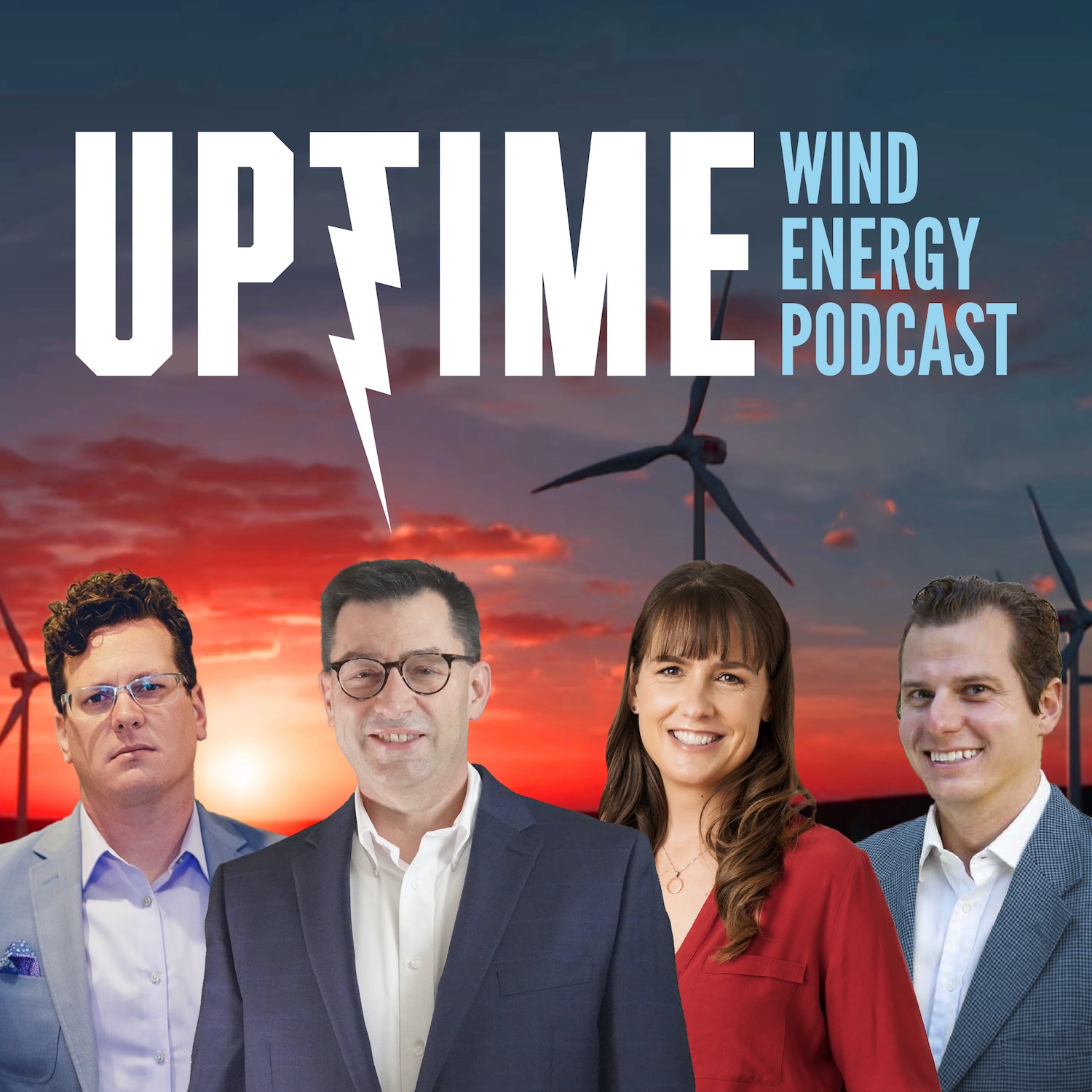Renewables Surpass Coal Globally, Despite US Setbacks
Update: 2025-10-20
Description
Solar and wind power are outpacing coal for the first time globally. However, the US faces challenges in meeting clean energy goals due to material shortages, a lack of skilled workers, and political roadblocks.
Sign up now for Uptime Tech News, our weekly email update on all things wind technology. This episode is sponsored by Weather Guard Lightning Tech. Learn more about Weather Guard's StrikeTape Wind Turbine LPS retrofit. Follow the show on Facebook, YouTube, Twitter, Linkedin and visit Weather Guard on the web. And subscribe to Rosemary Barnes' YouTube channel here. Have a question we can answer on the show? Email us!
Something remarkable happened this year.
For the first time in history, renewable energy generated more power than coal worldwide. Solar grew thirty-one percent in just six months. Wind and solar together outpaced electricity demand.
China built more clean energy in half a year than the rest of the world combined. India's renewable growth beat demand. Their fossil fuel use dropped.
Why? Simple economics.
Wind and solar are now the cheapest sources of electricity.
But here in America, we have a problem.
Johns Hopkins researchers just discovered we'll fall thirty-four percent short of our clean energy goals by twenty fifty. Not because renewables cost too much. Because we don't have the materials to build them.
Nickel. Silicon. Rare earth elements with names like neodymium and dysprosium. China controls ninety percent of the processing. And last week, they announced export controls.
Meanwhile, in Britain...
They're creating four hundred thousand clean energy jobs by twenty thirty. Plumbers. Electricians. Welders. Building wind farms. Installing solar panels. Running smart grids.
Energy Secretary Ed Miliband put it simply: "Where are the good jobs of the future going to come from? This is the answer."
The Sizewell C nuclear plant alone needs ten thousand workers. But here's the rub - they need to triple their welders, double their plumbers. The workers don't exist yet.
Down in North Carolina...
Duke Energy just announced a new plan. They're delaying wind projects. Extending coal plants. Not because coal is cheaper - it isn't. But because artificial intelligence and data centers are driving electricity demand eight times faster than expected.
Glen Snider from Duke says they need reliability while demand surges.
The irony?
Duke's moving away from the cheapest new sources of power - wind and solar - just when they need the most electricity. They're choosing to extend expensive coal plants that cost more to run.
Australia sees opportunity...
Treasurer Jim Chalmers is in New York meeting with Blackstone and Wall Street. Australia has lithium, manganese, rare earths. They claim they can deliver the world's lowest-cost renewable electricity by twenty fifty.
"Australia has exactly what the world needs, when the world needs it," Chalmers says.
Think about this...
The technology works. Solar and wind are cheaper than coal. Batteries can store the power. Countries using these technologies are seeing their energy costs drop.
But America faces three bottlenecks:
First, we don't control the materials. Second, we don't have the skilled workers. Third, states like North Carolina are choosing reliability over cost savings.
President Trump calls renewables "a joke." But JP Morgan says something different. They say America will have to use renewable energy whether we like it or not. Nuclear takes too long to build. Fossil fuels cost too much.
The numbers tell the story...
Britain: Four hundred thousand new jobs. America: Seven hundred thirty gigawatts short of materials. North Carolina: Eight times the demand growth. Global renewables: Cheaper than coal for the first time.
We're watching the free market work. The cheapest energy is winning worldwide. Except in places where politics and supply chains get in the way.
Sign up now for Uptime Tech News, our weekly email update on all things wind technology. This episode is sponsored by Weather Guard Lightning Tech. Learn more about Weather Guard's StrikeTape Wind Turbine LPS retrofit. Follow the show on Facebook, YouTube, Twitter, Linkedin and visit Weather Guard on the web. And subscribe to Rosemary Barnes' YouTube channel here. Have a question we can answer on the show? Email us!
Something remarkable happened this year.
For the first time in history, renewable energy generated more power than coal worldwide. Solar grew thirty-one percent in just six months. Wind and solar together outpaced electricity demand.
China built more clean energy in half a year than the rest of the world combined. India's renewable growth beat demand. Their fossil fuel use dropped.
Why? Simple economics.
Wind and solar are now the cheapest sources of electricity.
But here in America, we have a problem.
Johns Hopkins researchers just discovered we'll fall thirty-four percent short of our clean energy goals by twenty fifty. Not because renewables cost too much. Because we don't have the materials to build them.
Nickel. Silicon. Rare earth elements with names like neodymium and dysprosium. China controls ninety percent of the processing. And last week, they announced export controls.
Meanwhile, in Britain...
They're creating four hundred thousand clean energy jobs by twenty thirty. Plumbers. Electricians. Welders. Building wind farms. Installing solar panels. Running smart grids.
Energy Secretary Ed Miliband put it simply: "Where are the good jobs of the future going to come from? This is the answer."
The Sizewell C nuclear plant alone needs ten thousand workers. But here's the rub - they need to triple their welders, double their plumbers. The workers don't exist yet.
Down in North Carolina...
Duke Energy just announced a new plan. They're delaying wind projects. Extending coal plants. Not because coal is cheaper - it isn't. But because artificial intelligence and data centers are driving electricity demand eight times faster than expected.
Glen Snider from Duke says they need reliability while demand surges.
The irony?
Duke's moving away from the cheapest new sources of power - wind and solar - just when they need the most electricity. They're choosing to extend expensive coal plants that cost more to run.
Australia sees opportunity...
Treasurer Jim Chalmers is in New York meeting with Blackstone and Wall Street. Australia has lithium, manganese, rare earths. They claim they can deliver the world's lowest-cost renewable electricity by twenty fifty.
"Australia has exactly what the world needs, when the world needs it," Chalmers says.
Think about this...
The technology works. Solar and wind are cheaper than coal. Batteries can store the power. Countries using these technologies are seeing their energy costs drop.
But America faces three bottlenecks:
First, we don't control the materials. Second, we don't have the skilled workers. Third, states like North Carolina are choosing reliability over cost savings.
President Trump calls renewables "a joke." But JP Morgan says something different. They say America will have to use renewable energy whether we like it or not. Nuclear takes too long to build. Fossil fuels cost too much.
The numbers tell the story...
Britain: Four hundred thousand new jobs. America: Seven hundred thirty gigawatts short of materials. North Carolina: Eight times the demand growth. Global renewables: Cheaper than coal for the first time.
We're watching the free market work. The cheapest energy is winning worldwide. Except in places where politics and supply chains get in the way.
Comments
In Channel







